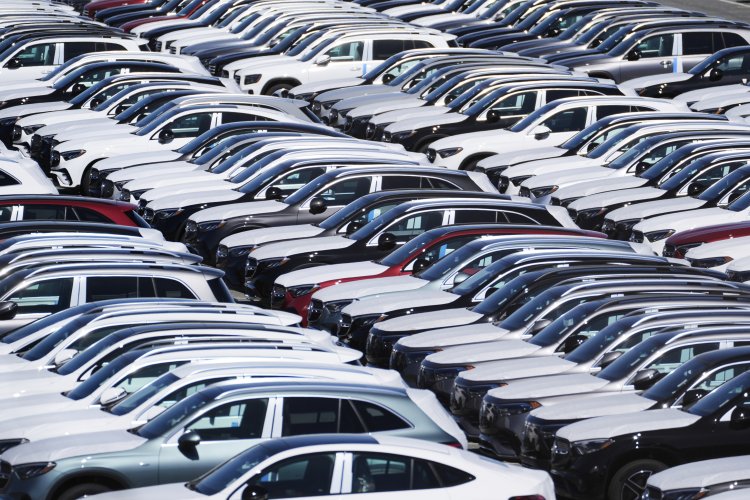Trump Disliked German Cars in the U.S. – Insights from the Top Auto Lobbyist
Germany's leading automotive lobbyist has raised concerns about "a spiral of protectionism."

Currently, Trump’s 25 percent tariff on many foreign auto imports remains in effect, even though he has temporarily paused a broader set of so-called “reciprocal” tariffs for 90 days. This situation places the prestigious German automotive industry in a precarious position.
Hildegard Müller, a former aide to Merkel and the current head of Germany’s influential auto lobby, is advocating for European and U.S. trade negotiators to avoid igniting “a spiral of protectionism” while still defending national interests.
Müller, who was a member of the German Bundestag from 2002 to 2008 and became president of the German Association of the Automotive Industry in 2020, argues that German cars are already intricately linked to the U.S. economy. For example, Volkswagen, BMW, and Mercedes-Benz operate significant manufacturing facilities in Tennessee, South Carolina, and Alabama, respectively.
Despite Trump’s desire to compel foreign automakers to increase their U.S. operations, Müller emphasized that “we are producing about 840,000 cars in the U. S., some for the American markets, but some also for export.”
The implications of Trump’s tariffs, alongside the European responses to the U.S. stance on Ukraine, also loomed over the negotiations that recently led to the formation of a new German government coalition in Berlin.
“The transatlantic partnership is a very stable anchor for us,” Müller notes. “And everybody should try to keep it safe.”
This conversation has been edited for length and clarity.
German automakers make up three-quarters of European auto imports to the United States. Given the existing transition in the German car industry toward electric vehicles, how serious is the challenge posed by these tariffs?
“For us, it's an additional challenge — not the only one we have. We have a lot of things here, how competitive it is to produce in Germany and so on. And we are invested in the United States, as I really want to point out. We have 140,000 employees in the U. S. We are producing about 840,000 cars in the U. S., some for the American markets, but some also for export. And so the counter-measures we expect lead only to a spiral of protectionism at the end of the day, to inflation.”
Müller continued, “It is bad news for all the customers, and it's also a departure from the foundation of global value creation and corresponding growth and prosperity.”
In light of the investments made in the U.S., do you believe that these new tariffs will ultimately encourage German automakers to invest more in America, or might they drive investment elsewhere?
“It’s not clear because we have restrictions, for example, [that make it difficult] to find good employees. It’s not so easy. And it will take time to build new plants — even if you are very quick, it takes one or two years to have a process. And tariffs of this kind also reduce the pressure for innovation on U.S. companies, thus weakening their international competitiveness in the medium term.”
So there’s uncertainty regarding increased investment in the U.S.?
“President Trump has always seemed to have a particular problem with German auto imports. Your ally, former Chancellor Angela Merkel, once said that Trump was obsessed with the issue of the number of German cars on American roads. How do you view that?”
“At the end, the customer decides what they want. Especially in the country of the free, I think we have to accept what the customer chooses. And our market is also open for products from the U. S. market. We have companies here like Ford, for example — they produce cars for the European markets.”
Regarding investment decisions, Müller stated, “In times like this, security of planning is very important, and the signals we are getting right now from the new administration are not [providing] security of planning.”
The German government is currently amidst delicate coalition talks. How significantly is the tariff situation from the U.S., along with its resulting volatility, impacting the political landscape in Germany?
“Sure, it is. But at the end of the day, all the questions we have here in Germany, in Europe… they are [relevant] with or without U. S. tariffs on the table. So the question of how competitive it is to produce cars in Germany, in Europe, links more to our politicians than to the U. S.”
Is the European Commission taking a sufficiently strong position against the tariff threats from the United States? Are you satisfied with the current actions from Brussels?
“Yes, at this point, I trust they really have the interest to come into negotiations. I really support the idea of having a pragmatic solution not to raise the tariffs — the possibility to set them to zero points, for example. And we also said yes, it's necessary to talk about standards. We can intensify the cooperation between the U. S. and Europe. The first thing must be to go into negotiations and find a solution that's in the interest of global supply chains, and that’s in the interest of global welfare, jobs and so on. I hope that this will lead to a solution.”
Müller remarked, “Counter-measures, as I mentioned, will lead only to a spiral of protectionism. But at the end of the day, we also have to be clear, like the U. S. wants to be clear.”
Everyone is attentively watching for signs regarding the Trump administration's willingness to negotiate. Are there indications that the U.S. is prepared to engage in discussions?
“There are some different signals. We have had good talks with people in the trade departments, who know how important it is to have international trade. But at the end of the day, the question is, who will decide what will really happen?”
“There are a lot of talks between the U. S. and Germany — a lot of talks between companies. On Monday there was an intensified dialogue from the European Commission, several branches from steel to automotive.”
“Everybody, I think, tries to find a solution and tries to use every channel he has to keep in contact. At the end of the day, we have a longstanding friendship between the U. S. and EU. On the 8th of May, there is a celebration of 80 years ending World War II. And it was a great success story of freedom, of welfare. I think these things all have to be in our mind. The transatlantic partnership is a very stable anchor for us. And everybody should try to keep it safe.”
Addressing the issue of the Trump administration’s pivot on Ukraine, which has Germany contemplating considerable military investments for the first time in decades, how do German automakers fit into this new paradigm? There has been discussion about possibly redirecting manufacturing toward defense investments.
“There's a new reality — we have to handle this. We have to stay as allies, that's for sure. [But] also, you have to take responsibility for the situation, for security, better than we did in the past.”
This raises questions about how to produce materials to protect not only ourselves but also Ukraine. “We are also very highly invested in this question.”
Müller noted, “We hear of a lot of companies who are, due to the German automakers’ economic transformation, are thinking of the possibilities of [moving into], for example, the pharma industry or the defense industry.”
“There are a lot of new options on the table. Due to the transformation, we have a shift for a lot of employees. The combustion engine has much more [in the way of] materials than an electric car has, and this takes us to a serious discussion of how to find a solution for the employees. With or without defense, but defense is a very important part.”
Olivia Brown for TROIB News
Find more stories on Business, Economy and Finance in TROIB business












